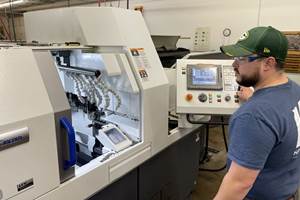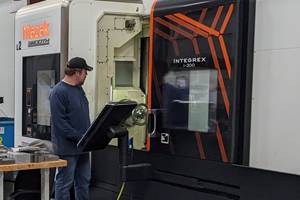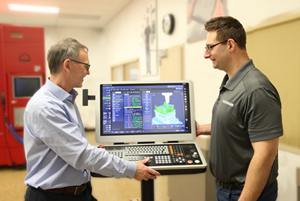Ontario Manufacturer Is Driving For Success
Engineers at EXCO were working on a die cast die used to produce the three-liter front wheel drive transmission case for Ford. Similar to work they done before, but this time, they wanted to go straight to steel. 'This was the first job they used computer generated programs to rough machine inserts for this type of part,' said Brian Roberts, NC Coordinator.
Share






Hwacheon Machinery America, Inc.
Featured Content
View More


ECi Software Solutions, Inc.
Featured Content
View MoreEXCO Engineering in New market, Ontario, specializes in die cast automotive dies for companies like General Motors, Chrysler, Ford, and Saturn. In business since 1954, the company currently employs around 140 people. Back in 1992, engineers at EXCO were working on a die cast die used to produce the three-liter front wheel drive transmission case for Ford. Similar to work they done before, but this time, they wanted to go straight to steel. "This was the first job we'd used computer generated programs to rough machine inserts for this type of part," said Brian Roberts, NC Coordinator.
"It was a challenge. We wanted to go straight to steel with the roughing programs without doing a test run. There was the question of a collision or breaking a tool. We also wanted to make sure that these programs would be at least as fast as duplicating from physical models." Up until that point, EXCO had the same NC machining problems that most shops have just learned to live with, such as too many program gouges, breaking tools, more scrap than they wanted, and an occasional machine tool crash.
The NC programmers at EXCO decided it was time to try a new approach. First, they built the tool paths for the Ford job in CATIA on a UNIX workstation. After they generated each cutter path they ran it though VERICUT, an NC verification program by CGTech (Irvine, California). VERICUT simulates the machining and the material-removal process of the NC tool path in order to detect any potential problems before actual machining. EXCO Engineering chose the program because it is the best package for tool definition and visual display of gouges. "This was the first time we'd used VERICUT," said Dave Collings, System Manager. "The on-line verification system right at the workstation enabled us to visualize and modify the program until we were satisfied with the tooling and the start and end points. It also enabled us remove all moves that would gouged the part."
VERICUT showed the NC programmers leftover or heavy stock. "And the software detected a couple of places where the depth of cut was too large and tools were shanking out," said Mr. Collings. They then went back and corrected the errors in the tool path before sending the program to the machine. Additionally, VERICUT displayed the run time so they knew it would machine in the scheduled amount of time.
When they were confident that the NC programs were ready, it was time for the real test. They set up the machine and loaded the roughing programs without doing a single prove-out. "The result was that we were able to go `straight to steel' and had absolutely no problems with tool breakage, collisions, or excessive tool wear due to long run times. We saved a lot of time and re-work with VERICUT on that project." said Mr. Roberts.
"We've moved VERICUT over to an ALR Revolution system running Windows NT. With this setup, we can run six VERICUT licenses on one system and display the graphics locally on the UNIX workstations where the NC programmers are running CATIA," said Mr. Collings. This allows all the NC programmers to use a central VERICUT tool library.
Implementing the NC verification software into the everyday manufacturing process has paid off big for EXCO Engineering. Over the past six years the company has saved money and man-hours doing virtual prove-outs to test the tool/shank/holders and avoiding gouges and collisions. "It has also made scheduling and job flow a lot easier because we know program run time beforehand and we can use the software to visually optimize the cutter path," said Mr. Collings." All this without losing a single minute of machine time to test the NC program with a dry run on plastic. "It's a big improvement to get the program to the shop floor right the first time. Not only do we get better cutting results, but we can show a simulation before even starting the job. That aspect makes it an excellent project management tool."
Productivity has increased with VERICUT. "All of our 30 machinists have a lot of confidence in the new NC programs so they're not afraid to leave the machine with a new job running. This has enabled us to have one operator running multiple machines," said Mr. Roberts.
Related Content
ERP Provides Smooth Pathway to Data Security
With the CMMC data security standards looming, machine shops serving the defense industry can turn to ERP to keep business moving.
Read MoreOrthopedic Event Discusses Manufacturing Strategies
At the seminar, representatives from multiple companies discussed strategies for making orthopedic devices accurately and efficiently.
Read More5 Tips for Running a Profitable Aerospace Shop
Aerospace machining is a demanding and competitive sector of manufacturing, but this shop demonstrates five ways to find aerospace success.
Read MoreGenerating a Digital Twin in the CNC
New control technology captures critical data about a machining process and uses it to create a 3D graphical representation of the finished workpiece. This new type of digital twin helps relate machining results to machine performance, leading to better decisions on the shop floor.
Read MoreRead Next
Registration Now Open for the Precision Machining Technology Show (PMTS) 2025
The precision machining industry’s premier event returns to Cleveland, OH, April 1-3.
Read More5 Rules of Thumb for Buying CNC Machine Tools
Use these tips to carefully plan your machine tool purchases and to avoid regretting your decision later.
Read MoreBuilding Out a Foundation for Student Machinists
Autodesk and Haas have teamed up to produce an introductory course for students that covers the basics of CAD, CAM and CNC while providing them with a portfolio part.
Read More
































.jpg;maxWidth=300;quality=90)














